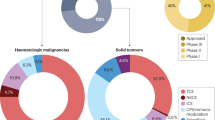Abstract
A hybrid hybridoma secreting a bispecific hybrid mAb (bsmAb), which recognizes both the epidermal growth factor receptor (EGF-R) and the drug doxorubicin, was produced by somatic hybridization of two hybridomas. The bsmAb obtained was able to retarget doxorubicin cytotoxicity in vitro specifically on EGF-R-positive cells exerting at the same time an antidotal effect on cells that did not overexpress the EGF-R. Distribution studies in mice indicate that the bsmAb selectively delivers the drug to tumour cells and modifies doxorubicin biodistribution with a statistically significant decrease of drug concentration in the intestine, which is the main target of early anthracycline toxicity. In keeping with this finding is the remarkable antidotal activity exerted by bsmAb in mice treated with doxorubiein, which is proved by retardation in loss of body weight and mortality. The effectiveness on tumour growth of the mAb followed by the administration of doxorubicin appears to be equal to that of the drug alone; however, the bsmAb exerts a remarkable antidotal activity.
Similar content being viewed by others
References
Aboud-Pirak E, Hurwitz E, Pirak ME, Bellot F, Schlessinger J, Sela M (1988) Efficacy of antibodies to epidermal growth factor receptor against KB carcinoma in vitro and in nude mice. J Natl Cancer Inst 80: 1605
Baldwin RW, Byers VS, Pimm MV (1988) Monoclonal antibodies and immunoconjugates for cancer treatment. In: Pinedo HM, Longo DL, Chabner BA (eds) Cancer chemotherapy and biological response. Elsevier, Amsterdam, p 397
Balsari A, Alzani R, Parrello D, Morelli D, Tagliabue E, Gianni L, Isetta ANI, Ménard S, Colnaghi MI, Ghione M (1988) Monoclonal antibodies against doxorubicin. Int J Cancer 42: 798
Balsari A, Morelli D, Ménard S, Tagliabue E, Colnaghi MI, Ghione M (1990) A new monoclonal antibody recognizing anthracyclinic molecule. Anticancer Res 10: 129
Balsari A, Ménard S, Colnaghi MI, Ghione M (1991) Anti-drug monoclonal antibodies antagonize toxic effect more than antitumor activity of doxorubicin. Int J Cancer 47: 889
Braslawsky GR, Kadow K, Knipe J, McGoff K, Edson M, Kaneko T, Greenfield RS (1991) Adriamycin(hydrazone)-antibody conjugates require internalization and intracellular acid hydrolysis for antitumor activity. Cancer Immunol Immunother 33: 367
Corvalan JRF, Smith W (1987) Construction and characterization of a hybrid-hybrid monoclonal antibody recognizing both carcinoembryonic antigen (CEA) and vinca alkaloids. Cancer Immunol Immunother 24: 127
Ey PL, Prowse SJ, Jenkins CR (1978) Isolation of pure IgG1, IgG2 and IgG2b immunoglobulins from mouse serum using protein A-Sepharose. Immunochemistry 15: 429
Laemmli VK (1970) Cleavage of structural proteins during the assembly of the head of bacteriophage T4. Nature 227: 680
Mars WM (1988) Antibody-mediated routing of diphteria toxin in murine cells results in a highly efficacious immunotoxin. J Biol Chem 263: 15933
Ménard S, Canevari S, Colnaghi MI (1989) Hybrid antibodies in cancer diagnosis and therapy. Int J Biol Markers 4, n. 3: 131
Milstein C, Cuello AC (1983) Hybrid hybridomas and their use in immunohistochemistry. Nature 305: 537
Order SE, Sleeper AM, Stillwagon GB, Klein JL, Leichner PK (1990) Radiolabelled antibodies: results and potential in cancer therapy. Cancer Res 50: 1011
Pellegrini R, Centis F, Martignone S, Mastroianni A, Tagliabue E, Tosi E, Ménard S, Colnaghi MI (1991) Characterization of a monoclonal antibody directed against the epidernal growth factor receptor binding site. Cancer Immunol Immunother 34: 37
Pimm MV, Robins RA, Embleton MJ, Jacobs E, Markham AJ, Charleston A, Baldwin RW (1990) A dispecific monoclonal antibody against methotrexate and a human tumor associated antigen augments cytotoxicity of methotrexate-carrier conjugate. Br J Cancer 61: 508
Richardson J, Ford CHJ, Tsaltas G, Gallant ME (1989) Doxorubicin-anti-carcinoembryonic antigen immunoconjugates activity in vitro. Eur J Cancer Clin Oncol 25: 633
Sardini A, Villa E, Morelli D, Chione M, Ménard S, Colnaghi MI, Balsari A (1992) An anti-doxorubicin monoclonal antibody modulates kinetic and dynamic characteristics of the drug. Int J Cancer 50: 617
Smith W, Jarrett AL, Beattie RE, Corvalan JRF (1992) Immunoglobulins secreted by a hybrid-hybridoma: analysis of chain assemblies. Hybridoma 11: 87
Yang H, Reisfeld RA (1988) Doxorubicin conjugated with monoclonal antibody directed to a human melanoma-associated proteoglycan suppresses the growth of established tumor xenografts in nude mice. Proc Natl Acad Sci USA 85: 1189
Author information
Authors and Affiliations
Rights and permissions
About this article
Cite this article
Morelli, D., Sardini, A., Villa, E. et al. Modulation of drug-induced cytotoxicity by a bispecific monoclonal antibody that recognizes the epidermal growth factor receptor and doxorubicin. Cancer Immunol Immunother 38, 171–177 (1994). https://doi.org/10.1007/BF01525638
Received:
Accepted:
Published:
Issue Date:
DOI: https://doi.org/10.1007/BF01525638




